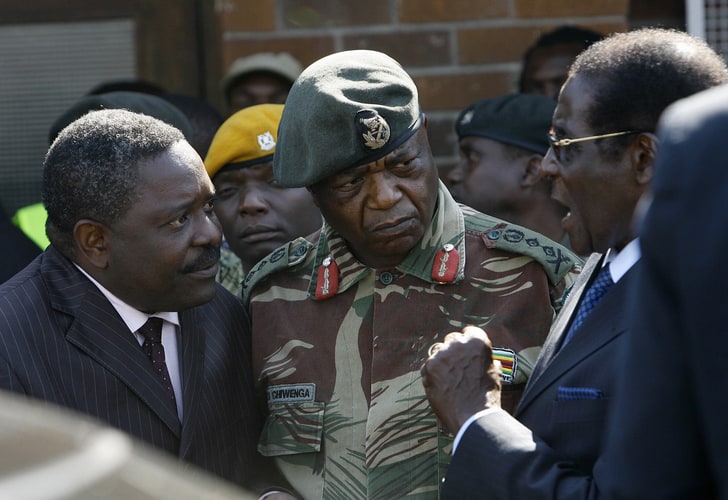FEAR of treason charges and a possible counter-coup that then Justice minister Happyton Bonyongwe tried to set up around now Agriculture minister Retired Chief Air Marshal Perrance Shiri spurred delicate negotiations following the military coup that toppled former President Robert Mugabe in November 2017.
Minutes that made up discussions in cliff-hanger meetings held between Mugabe, at the time under house arrest, and military generals led by then Zimbabwe Defence Forces (ZDF) commander General Constantino Chiwenga between November 15 and 16, 2017 expose the intricacies of the coup plot.
The coup came after then Vice-President Emmerson Mnangagwa had been summarily fired from both government and ruling Zanu PF party, prompting him to flee to South Africa for security reasons.
Mnangagwa had been sacked by Mugabe on November 6 as the situation in the country deteriorated, forcing Chiwenga out of the closet to declare that the military was ready to “step in” to restore sanity.
The then ZDF statement was made on November 13 before the coup moved into full swing late on the 14th.
The mediation team comprised of Roman Catholic cleric Father Fidelis Mukonori, Mugabe’s then spokesperson George Charamba, who acted as secretary during the negotiations as well as Chief Secretary to the President and Cabinet, Misheck Sibanda.
The team also included then Public Service Commission chairperson Mariyawanda Nzuwa and former Foreign Affairs ministry secretary Joey Bimha as well as Central Intelligence Organisation (CIO) deputy director-general Aaron Nhepera.
The minutes signed by Mukonori, Charamba and Nhepera, reveal that Mugabe could have been hoodwinked during the intricate negotiations. It is also revealed that Bonyongwe, who had just been appointed Justice minister by Mugabe tried to set up a counter-force to stop the coup.
“The President was informed about mounting tension and concern within the command element triggered by a mobile communication message attributed to the new Minister of Justice, and former director-general of the Central Intelligence Organisation, Rtd General Bonyongwe, to Air Marshall Perrance Shiri who is in Dubai on official business allegedly urging him to fly back to join in efforts towards a counter-operation whose backbone would be the police force commanded by Commissioner-General Augustine Chihuri.
“It was drawn to the President’s attention that Commissioner Chihuri had not attended the inaugural Wednesday (November 15) meeting after which he did not turn up for the rest,” the minutes read in part. Chihuri has since then never made a public appearance, while Bonyongwe has since recoiled into private life.
It is revealed that in the subsequent meetings with Mugabe, basically a sitting duck following the bloodless military takeover, the then Zanu PF leader was told of anxiety over the actions of the police force.
“Instances of friction between the military and the Zimbabwe Republic Police were also drawn to the President’s attention, culminating in what appeared to be a withdrawal of the police force from policing duties at least in Harare.
“The President was informed that the command element had made it clear that a counter-force against their operation would constitute an escalation, which was bound to lead to a bloody outcome,” documents show. Bonyongwe, according to the minutes, was trying to craft a law that would have had Chiwenga and his co-conspirators charged with treason.
Since then the police have never recaptured public trust and the authority it commanded during Mugabe’s reign with the army a constant feature during operations. The growing influence of the military has raised fears among critics given the bloody shooting on August 1 last year last month — the two incidences which have left over 20 people dead and dozens with gunshot wounds.
While Mnangagwa, on his return, admitted that he had been in constant touch with the country’s security leadership, Mugabe was apparently told that reports that Chiwenga had met the then former Vice-President were fabricated.
“The mediation team was able to provide facts that dispelled claims that Chiwenga had made a diversion and stop-over in South Africa en-route to Zimbabwe from China in order to meet with dismissed former Vice-President Emmerson Mnangagwa and his team thought to include Cde Christopher Mutsvangwa and Zimbabwe’s ambassador to South Africa, Ambassador Isaac Moyo.
“More importantly, the mediating team told the President that the operation by the command element was not calculated at top leadership change in the party and country, a process which had to be left to the party running in a fair, clean and just way and which had to be superintended by the President himself without undue influence,” the report shows.
Mutsvangwa, the chairman of the Zimbabwe National Liberation War Veterans’ Association, a key figure in Mugabe’s fall, was to be appointed special adviser to Mnangagwa, while Moyo now heads the CIO.
NewsDay













